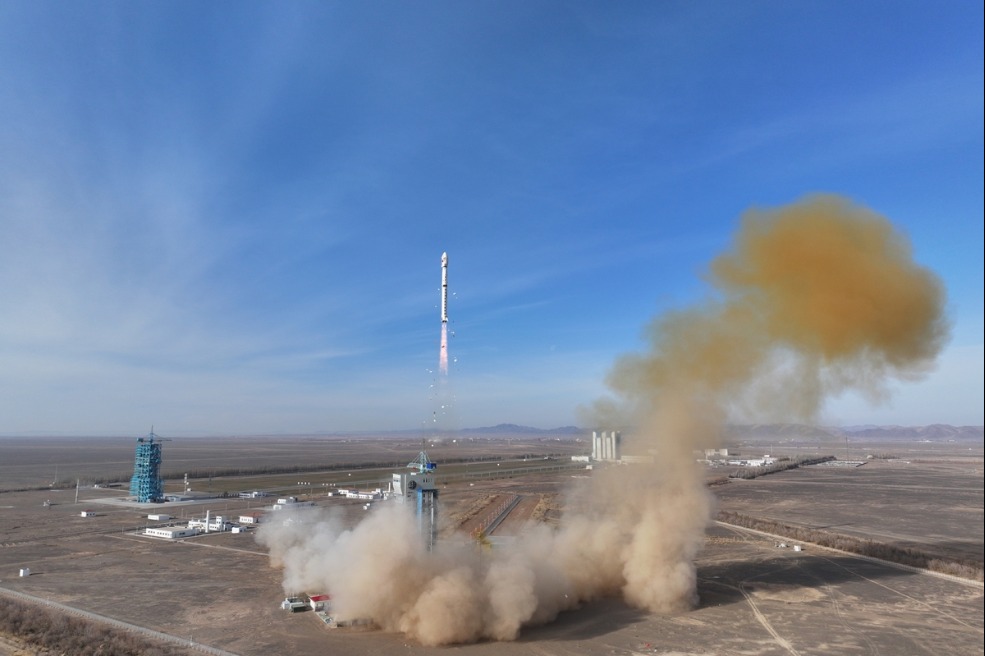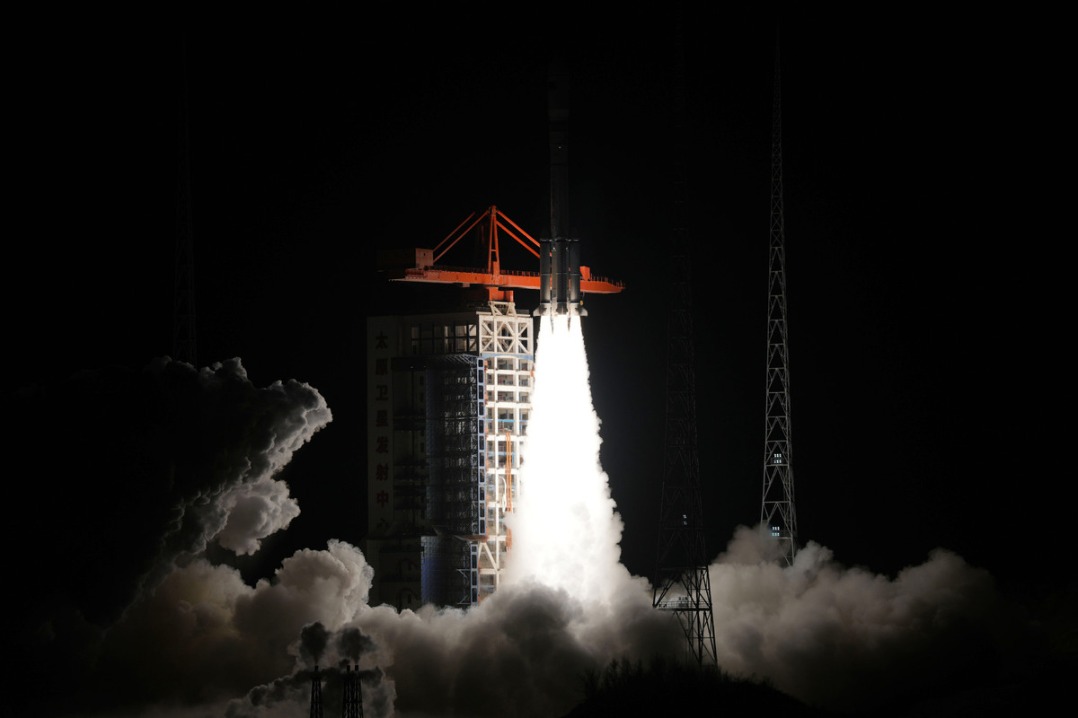Xi cements neighborly bonds with SCO friends


On July 15, President Xi Jinping received top diplomats and heads of standing bodies of the Shanghai Cooperation Organization in the bright, stately Fujian Hall of the Great Hall of the People in Beijing.
"China has always prioritized the SCO in its neighborhood diplomacy, and is committed to making the organization more substantive and stronger," Xi stressed at the meeting.
The pledge echoes China's yearslong unremitting efforts to foster a friendly neighborhood of peace and development on the SCO stage.
China's neighborhood policy — which Xi elaborated on during his trip to Astana, Kazakhstan, in June — features a firm belief in an amicable, secure and prosperous global neighborhood as well as a strong dedication to amity, sincerity, mutual benefit and inclusiveness.
Xi is hosting this year's two-day SCO summit in the northern port city of Tianjin, where he and fellow organization leaders are charting strategies for promoting greater regional security and prosperity, and taking solid steps toward building a closer SCO community with a shared future.
Forging 'big family' ties
Xi has made three overseas trips this year. Two of the destinations, Russia and Kazakhstan, are both SCO member states.
Upon his arrival at the airport in Astana during the June visit for the second China-Central Asia Summit, Xi was warmly greeted by an old friend, Kazakh President Kassym-Jomart Tokayev. It was Xi's sixth visit to the neighboring country since he became China's president.
The China-Central Asia Summit is designed to cement China's bond with its landlocked neighbors along the ancient Silk Road.
"A Central Asian proverb compares harmony and unity to happiness and wealth," Xi said at the gathering. "We always wish our neighbors well."
China is among the countries with the highest number of neighboring nations. For decades, fostering closer partnerships with its neighboring countries has been a ballast in the layout of Beijing's foreign policy. Xi has paid particular attention to cultivating a peaceful and friendly neighborhood.
Back in 2013 when he was first elected China's head of state, Xi put forward the principle of "amity, sincerity, mutual benefit and inclusiveness" at a meeting on China's neighborhood diplomacy, the first such conference held since the founding of the People's Republic of China in 1949.
At a central conference on work related to neighboring countries held in Beijing in April, Xi called for building a community with a shared future with neighboring countries.
Good-neighborliness has been a constant theme in Xi's agenda on the SCO stage. During his SCO debut in 2013 at the summit in Bishkek, Kyrgyzstan, Xi proposed an earnest implementation of the Treaty on Long-Term Good-Neighborliness, Friendship and Cooperation among the SCO member states. Xi has described both the treaty and the SCO Charter as two documents that "lay down the principles and give guidance to SCO member states in their work".
In subsequent years, Xi proposed an action plan for the 2018-2022 period to implement the established SCO good-neighborliness treaty, and pushed for its adoption at the landmark summit in Qingdao, Shandong province, in 2018, which was the first time Xi hosted an SCO summit in China. A comprehensive plan for 2023-2027 on the implementation of the treaty was adopted in 2022 in Samarkand, Uzbekistan.
The SCO, which does not engage in alliances or target others, embraces openness and inclusiveness. In Xi's own words, it is like a "big family".
Over the years, China has been deepening ties with the SCO's founding members and new partners alike. Under the guidance of the Shanghai Spirit, which is founded on mutual trust, mutual benefit, equality, consultation, respect for the diversity of civilizations and pursuit of common development, the SCO has grown into a comprehensive regional organization with the most extensive geographical coverage and population in the world, encompassing 10 member states, two observer states and 14 dialogue partners.
Belarus officially became the SCO's 10th member at last year's Astana summit. In June, Xi received Belarusian President Alexander Lukashenko at the Zhongnanhai compound in Beijing. Lukashenko told Xi during his visit that he truly felt the profound friendship extended by China.
This is just one example of Xi's regular exchanges with his fellow SCO leaders. Since 2023, he has met with leaders of SCO member states dozens of times — whether on the sidelines of SCO summits, at other multilateral gatherings or during their visits to China. These high-level interactions have not only strengthened coordination within the SCO, but have also helped build closer personal rapport among its leaders.
"Between relatives and friends alike, with closer interaction, the affinity grows," Xi once said.
Shared home of peace
The blue glass of the futuristic facade of the Palace of Independence shone in the sunlight when SCO leaders arrived in Astana in July 2024 for their annual gathering. In his speech delivered at the group's first-ever "SCO Plus" Meeting, Xi called for the establishment of a more beautiful home for the SCO by building "a common home of peace and tranquility".
The SCO was born more than two decades ago when the acute security challenges of terrorism, separatism and extremism — the "three evil forces" — posed a menacing threat in Central Asia and neighboring areas. Since its founding in 2001, the group has maintained safeguarding regional security as a mainstay of collaboration.
"Security is a prerequisite for national development, and safety is the lifeline to the happiness of the people," Xi said in Astana.
For years, the Chinese leader has championed strengthening security cooperation to provide lines of defense for SCO members. At the SCO Dushanbe Summit in Tajikistan in 2014, Xi proposed that members negotiate and sign the SCO Convention on Countering Extremism. The convention was signed by member states in Astana in 2017.
Xi has also been a strong advocate of the SCO's fight against drug trafficking, organized crime and cyber-terrorism, resulting in notable successes.
On the drug trafficking front, the group organizes anti-drug operations regularly and has renewed its Anti-Drug Strategy for five years. In its most recent development, SCO members carried out an anti-drug operation dubbed "Web" earlier this month, with China chairing the coordination headquarters. The operation seized nearly 10 metric tons of narcotics and identified 1,151 crimes related to illicit drug trafficking.
Apart from the SCO, Xi also seeks to advance common security in the region through other channels of cooperation, stating that "a vision of harmony and peaceful co-existence underpins China's neighborhood diplomacy."
At the 2014 Shanghai Summit of the Conference on Interaction and Confidence Building Measures in Asia, Xi proposed a vision of common, comprehensive, cooperative and sustainable security. At the Boao Forum for Asia Annual Conference in Hainan province in 2022, he presented the Global Security Initiative, which Beijing views as a public good that advances global security governance.
"In enhancing security in Central Asia within the framework of the SCO, China undoubtedly plays an important and leading role," said Azamat Seitov, a scholar at Uzbekistan's University of World Economy and Diplomacy.
"Chinese initiatives... contribute to strengthening stability, economic development and reducing security threats in the region," Seitov said.
In today's interconnected world, peace remains fragile amid regional tensions and an uncertain security environment. This year marks the 80th anniversary of the victory of the World Anti-Fascist War. In May, Xi visited Moscow, where he attended a Red Square parade.
Xi once pointed out that the painful lesson of war should never be forgotten. In 2015, the year that marked the 70th anniversary of the end of the war, Xi noted that "all SCO member states endured the test of blood and fire of World War II and contributed to the final victory with enormous sacrifice" during his address at the SCO Ufa Summit in Russia. In a joint statement issued after the meeting, Xi and other convening leaders made a resolute call for peaceful development and progress of all nations.
"Only with a peaceful environment at our front door can we develop ourselves with ease and comfort," Xi once commented.
Fruits of prosperity
When China took over the SCO's rotating presidency from Kazakhstan last year, Xi proposed at the "SCO Plus" Meeting that 2025 be designated as the Year of Sustainable Development.
Over the past few years, Xi has emphasized boosting the sustainable development of the SCO through a spectrum of initiatives and cooperative projects. He sees that "true development is development for all, and good development is sustainable."
At the SCO Bishkek Summit in 2019, Xi announced an initiative to establish an SCO demonstration base for agricultural technology exchange and training in China's Shaanxi province, a concrete action to "make the SCO an example of mutually beneficial cooperation".
Unveiled a year later in the county-level city of Yangling, the SCO demonstration base has become a hub for trade, talent training and technology exchanges. The base has trained more than 2,000 agricultural officials and technicians from the SCO and developing countries, which has boosted poverty-reduction programs in those nations.
When the SCO Forum on Poverty Reduction and Sustainable Development was held in May in Xi'an, Shaanxi province, Xi sent a congratulatory letter to the forum. Representatives of SCO countries attending the event said the letter reflects China's commitment to working with all parties to build a beautiful world free from poverty.
Meanwhile, Xi has integrated his proposed development initiatives, including the Belt and Road Initiative, with the growth strategies of SCO countries.
The China-Kyrgyzstan-Uzbekistan railway project, launched late last year in Kyrgyzstan, is a prime example of a high-quality BRI cooperation project being developed among SCO member states. Personally promoted by Xi and his two Central Asian counterparts, the railway will become a strategic corridor linking China and Central Asia, boosting regional connectivity and trade, as well as strengthening people-to-people bonds.
The trade value between China and SCO member states, observer states and dialogue partners reached a record high $890 billion in 2024, accounting for some 14.4 percent of China's total foreign trade volume, according to official data.
"China's efforts to build a community with a shared future with its neighbors are not just a philosophical concept. It's a sustainable, multi-dimensional development blueprint grounded in mutual respect," said Serik Korzhumbayev, editor-in-chief of the Delovoy Kazakhstan newspaper.
Korzhumbayev noted that Xi's vision serves as a blueprint for fostering closer SCO cooperation.
"In the face of global turbulence and profound changes in the international landscape, strengthening ties with neighboring states will open new prospects for advancing regional prosperity and promoting a fairer and more just world," Korzhumbayev said. "The SCO undoubtedly plays a pioneering role in this regard."
- Cold wave to bring snow risks across northern China
- Reform, human rights protection go hand-in-hand for China, report finds
- China sends remote-sensing satellite into orbit
- China surpasses childcare goal ahead of schedule
- China rolls out 2-ton unmanned cargo plane
- China begins trial of faster, more detailed AI dust forecasting system


































